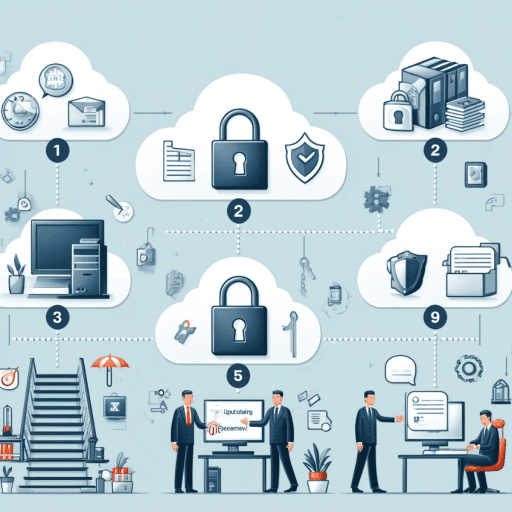Cross-border transactions play a crucial role in global business, allowing companies to expand their reach and tap into new markets. These transactions involve the exchange of goods, services, and capital between different countries, and they require careful planning and execution to ensure success. One of the key components in facilitating cross-border transactions is the use of virtual data rooms. These secure online platforms provide a centralized location for storing and sharing sensitive information, making the transaction process more efficient and secure.
Key Takeaways
- Virtual data rooms play a crucial role in cross-border transactions by providing a secure and efficient platform for sharing confidential information.
- The advantages of using virtual data rooms for cross-border transactions include increased transparency, improved due diligence, and cost-effectiveness.
- Virtual data rooms help overcome challenges in cross-border transactions such as language barriers, time zone differences, and cultural differences.
- Security features of virtual data rooms include encryption, access controls, and audit trails to ensure the confidentiality and integrity of data.
- Virtual data rooms enable transparency in cross-border transactions by providing a centralized platform for all parties to access and review information.
The Role of Virtual Data Rooms in Cross-Border Transactions
Virtual data rooms are online repositories that allow businesses to securely store and share documents during cross-border transactions. These platforms are specifically designed to meet the unique needs of cross-border transactions, providing a secure and efficient way to manage and exchange information. Virtual data rooms streamline the transaction process by eliminating the need for physical document storage and enabling real-time collaboration between parties involved in the transaction.
The Advantages of Using Virtual Data Rooms for Cross-Border Transactions
Using virtual data rooms for cross-border transactions offers several advantages. Firstly, it increases efficiency and speed by eliminating the need for physical document storage and allowing for instant access to information. This reduces the time spent on administrative tasks and speeds up the overall transaction process.
Secondly, virtual data rooms improve communication and collaboration between parties involved in the transaction. These platforms provide a centralized location for all relevant documents, making it easy for all parties to access and review them. Additionally, virtual data rooms offer features such as Q&A sections and document version control, which facilitate effective communication and collaboration.
Lastly, virtual data rooms enhance security and confidentiality during cross-border transactions. These platforms employ advanced security measures such as encryption, multi-factor authentication, and granular access controls to protect sensitive information from unauthorized access. This ensures that confidential information remains secure throughout the transaction process.
The Challenges of Cross-Border Transactions and How Virtual Data Rooms Help Overcome Them
Cross-border transactions come with their own set of challenges, including language and cultural barriers, time zone differences, and legal and regulatory compliance. Virtual data rooms help overcome these challenges by providing a centralized platform that can be accessed by all parties involved in the transaction, regardless of their location or time zone.
Language and cultural barriers can be addressed through the use of translation services within virtual data rooms. These services allow for the translation of documents and communication in real-time, ensuring that all parties can understand and participate in the transaction process.
Time zone differences can also be managed through the use of virtual data rooms. These platforms provide 24/7 access to information, allowing parties in different time zones to review documents and communicate at their convenience. This eliminates the need for scheduling conflicts and delays in the transaction process.
Legal and regulatory compliance is another challenge in cross-border transactions. Virtual data rooms help address this challenge by providing a secure and auditable platform for storing and sharing sensitive information. These platforms also offer features such as watermarking and document expiration to ensure compliance with legal and regulatory requirements.
The Security Features of Virtual Data Rooms for Cross-Border Transactions
Virtual data rooms prioritize security to protect sensitive information during cross-border transactions. These platforms implement various security measures to ensure the confidentiality, integrity, and availability of data.
One of the key security features of virtual data rooms is encryption. All data stored and transmitted within virtual data rooms is encrypted using advanced encryption algorithms. This ensures that even if unauthorized individuals gain access to the data, they will not be able to decipher it.
Virtual data rooms also employ multi-factor authentication to verify the identity of users accessing the platform. This adds an extra layer of security by requiring users to provide multiple pieces of evidence to prove their identity, such as a password and a unique code sent to their mobile device.
Granular access controls are another important security feature of virtual data rooms. These controls allow administrators to define and enforce access permissions for different users or user groups. This ensures that only authorized individuals can access specific documents or perform certain actions within the virtual data room.
The Importance of Transparency in Cross-Border Transactions and How Virtual Data Rooms Enable It
Transparency is crucial in cross-border transactions as it builds trust between parties and reduces the risk of fraud or misconduct. Virtual data rooms enable transparency by providing real-time access to information for all parties involved in the transaction.
Virtual data rooms offer a centralized location for storing and sharing documents, making it easy for all parties to access and review them. This ensures that everyone has the same level of visibility into the transaction process, reducing the risk of misunderstandings or hidden agendas.
Furthermore, virtual data rooms provide features such as document version control and activity tracking, which allow parties to see who has accessed or made changes to a document. This promotes transparency by providing an audit trail of all activities within the virtual data room.
The Efficiency of Virtual Data Rooms in Cross-Border Transactions
Virtual data rooms significantly improve the efficiency of cross-border transactions by streamlining the document management and communication processes. These platforms eliminate the need for physical document storage, reducing administrative tasks and saving time.
Virtual data rooms also enable real-time collaboration between parties involved in the transaction. Features such as Q&A sections and document version control facilitate effective communication and ensure that all parties are working with the most up-to-date information.
Moreover, virtual data rooms provide advanced search capabilities, allowing users to quickly find specific documents or information within a large repository. This saves time and improves efficiency by eliminating the need to manually search through physical documents or multiple file folders.
The Role of Virtual Data Rooms in Due Diligence for Cross-Border Transactions
Due diligence is a critical step in cross-border transactions, as it involves the thorough examination of a target company’s financial, legal, and operational records. Virtual data rooms play a crucial role in facilitating due diligence by providing secure access to relevant information.
Virtual data rooms offer a centralized location for storing and organizing due diligence documents, making it easy for potential buyers or investors to review them. These platforms also provide features such as document indexing and full-text search, which allow users to quickly find specific documents or information during the due diligence process.
Furthermore, virtual data rooms enable the secure sharing of due diligence documents with external parties such as legal advisors or auditors. This ensures that all relevant parties have access to the necessary information while maintaining the confidentiality and security of sensitive data.
The Cost-Effectiveness of Virtual Data Rooms in Cross-Border Transactions
Using virtual data rooms for cross-border transactions can be more cost-effective compared to traditional transaction methods. Virtual data rooms eliminate the need for physical document storage, reducing costs associated with printing, shipping, and storing paper documents.
Moreover, virtual data rooms save time by streamlining the document management and communication processes. This reduces the amount of time spent on administrative tasks and allows parties to focus on more strategic aspects of the transaction. Time saved translates into cost savings, as it reduces the overall duration of the transaction process.
The Customization Options of Virtual Data Rooms for Cross-Border Transactions
Virtual data rooms offer a range of customization options that can be tailored to meet the specific needs of cross-border transactions. These options allow businesses to create a virtual data room that aligns with their branding and provides a seamless user experience.
Customization options include the ability to add company logos, change color schemes, and customize user interfaces. Some virtual data room providers also offer white-labeling options, allowing businesses to fully customize the platform with their own branding.
Furthermore, virtual data rooms can be customized to meet specific compliance requirements or industry standards. For example, certain industries may require additional security measures or specific document retention policies. Virtual data room providers can work with businesses to ensure that the platform meets these requirements.
The Future of Virtual Data Rooms in Cross-Border Transactions and Global Business
Virtual data rooms are expected to become even more integral to cross-border transactions in the future. As global business continues to grow, the need for secure and efficient ways to manage and exchange information will become increasingly important.
Virtual data rooms have the potential to become the standard platform for cross-border transactions, replacing traditional methods such as physical document storage or email exchanges. These platforms offer a centralized and secure solution that can be accessed by all parties involved in the transaction, regardless of their location or time zone.
Furthermore, virtual data rooms can help facilitate global business growth by providing a secure and efficient way to expand into new markets. These platforms enable businesses to securely share sensitive information with potential partners or investors, reducing the risk of fraud or misconduct.
Virtual data rooms play a crucial role in facilitating cross-border transactions by providing a secure and efficient way to manage and exchange information. These platforms streamline the transaction process, improve communication and collaboration between parties, enhance security and confidentiality, and address challenges such as language barriers and time zone differences.
The security features of virtual data rooms protect sensitive information during cross-border transactions, while the transparency they enable builds trust between parties. Virtual data rooms also improve efficiency by eliminating the need for physical document storage and providing real-time access to information.
As global business continues to grow, virtual data rooms are expected to become even more integral to cross-border transactions. Businesses are encouraged to consider implementing virtual data rooms in their cross-border transactions to benefit from increased efficiency, improved security, and enhanced collaboration.
If you’re interested in learning more about data center security best practices, you might find this article on securing information with data center security measures helpful. It explores both physical and digital measures that can be implemented to ensure the safety and integrity of sensitive data. With the increasing reliance on virtual data rooms for cross-border transactions, understanding how to protect data within data centers is crucial. Check out the article here to gain valuable insights into data center security.
FAQs
What is a virtual data room?
A virtual data room is an online platform that allows businesses to securely store and share confidential documents with authorized parties during a transaction.
How do virtual data rooms facilitate cross-border transactions?
Virtual data rooms facilitate cross-border transactions by providing a secure and efficient way for parties in different countries to access and review confidential documents. This eliminates the need for physical meetings and allows for faster due diligence and decision-making.
What are the benefits of using a virtual data room for cross-border transactions?
The benefits of using a virtual data room for cross-border transactions include increased efficiency, reduced costs, improved security, and easier collaboration between parties in different countries.
What types of businesses use virtual data rooms for cross-border transactions?
Virtual data rooms are commonly used by businesses involved in mergers and acquisitions, fundraising, IPOs, and other types of cross-border transactions.
How do virtual data rooms ensure security?
Virtual data rooms ensure security through various measures such as encryption, two-factor authentication, and access controls. They also provide audit trails and activity reports to monitor user activity and prevent unauthorized access.
Can virtual data rooms be customized to meet specific business needs?
Yes, virtual data rooms can be customized to meet specific business needs such as branding, user permissions, and document organization. Some providers also offer additional features such as Q&A modules and analytics tools.






